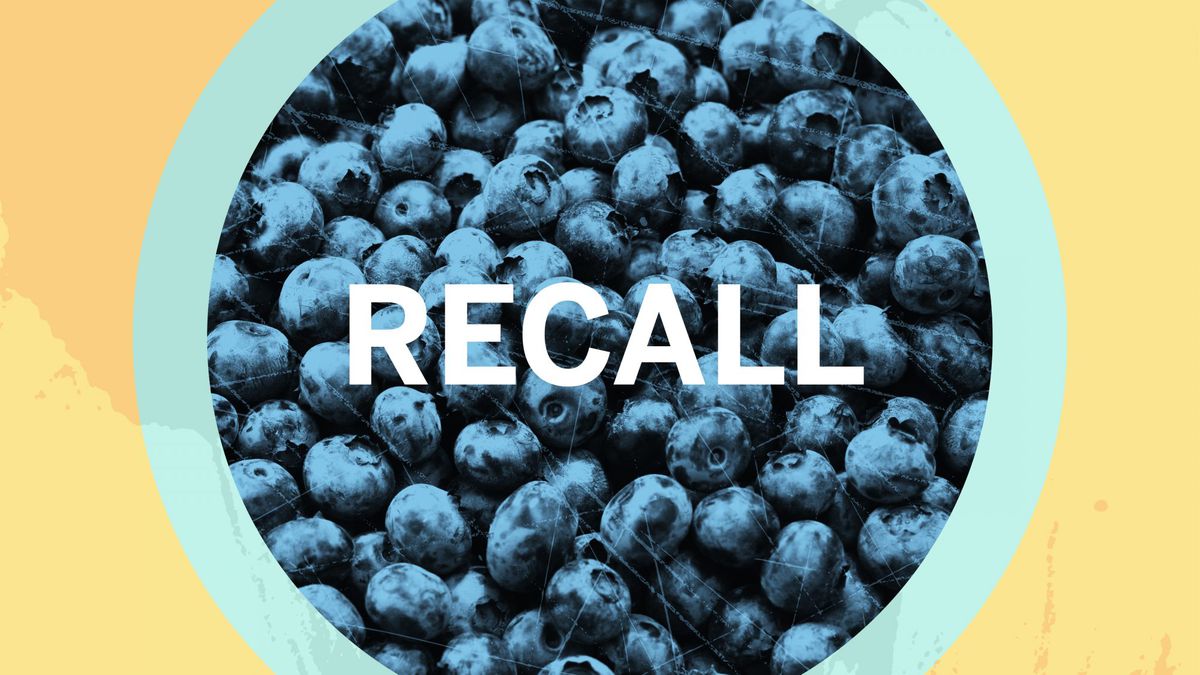Dole is recalling some cases of blueberries because of a potential Cyclospora contamination. Cyclospora is a parasite that can cause cyclosporiasis, an intestinal infection. The company made the announcement in a press release on June 25.
Here's what you need to know about the blueberry recall, Cyclospora, and cyclosporiasis.
Which blueberries are being recalled?
The recall affects "a limited number of cases of Dole Fresh Blueberries packaged in a variety of clamshell sizes," according to the company. Certain batches of 6 oz, 18 oz, 24 oz, and pint-size fresh blueberries are part of he recall. Dole is encouraging consumers to check the blueberries they have in their homes and to throw away any that match the information from the recall list. The exact UPC, pack out dates, and lot codes that are being recalled are listed on the Dole website.
The recalled blueberries were distributed in Illinois, Maine, New York, and Wisconsin, as well as in the Canadian provinces of Alberta and British Columbia. So far, no illnesses associated with the recall have been reported, according to Dole.
"Providing safe, nutritious product is a core tenet of the organization that Dole is 100% committed to. If a potential hazard is identified, we will always take the most precautionary measure to ensure safety," William Goldfield, director of corporate communications at Dole Food Company, Inc., tells Health.
The company points out that "no other Dole products are included in the recall" and says that "consumers with questions may call the Dole Consumer Center at (800) 356-3111, which is open 24 hours a day."
What is Cyclospora?
Cyclospora is a microscopic parasite. When Cyclospora is found in food or water, it means that the product has been contaminated with human feces, according to the US Food and Drug Administration (FDA). Contamination could happen if someone preparing or packaging the food is carrying the parasite and doesn't wash their hands after using the bathroom.
If someone eats or drinks an item contaminated with Cyclospora, they could develop cyclosporiasis, an intestinal illness that infects the small intestine.
After being exposed to Cyclospora, it takes about a week for a person to become sick, Academy of Nutrition and Dietetics spokesperson Cordialis Msora-Kasago, RDN, previously told Health. That's one reason the illness can be so hard to diagnose and keep track of. "By the time the symptoms manifest, it can be hard to know what exactly caused it," she says.
What are the symptoms of Cyclospora infection?
Some people infected with Cyclospora don't show any symptoms (though asymptomatic people can still contaminate food and pass it to others, according to the FDA). But the most common symptom of cyclosporiasis is "watery diarrhea, with frequent, sometimes explosive, bowel movements," the FDA says. Other common symptoms include:
- Loss of appetite
- Weight loss
- Stomach cramps/pain
- Bloating
- Increased gas
- Nausea
- Fatigue
If you have cyclosporiasis, you might also experience:
- Vomiting
- Body aches
- Headache
- Low-grade fever
- Other flu-like symptoms
These symptoms may seem to go away and then return one or more times. "You might start to wonder if you're coming down with the flu," says Msora-Kasago. "Or you might feel well today and think it's gone, and then tomorrow the same symptoms come back."
When should you seek treatment?
If you think you've been exposed to the recalled blueberries and have since developed diarrhea, you should see your primary care provider or other physician, Cynthia L. Sears, MD, professor of medicine at Johns Hopkins University School of Medicine, tells Health. "They should do so unless they are so ill—such as from dehydration, vomiting and diarrhea, dizziness, or high fever—that they need to go to the emergency department," she says.
Again, cyclosporiasis symptoms can be on and off, "so someone exposed who has diarrhea one day but it seems to go away then comes back should also see their doctor and request testing," Dr. Sears adds.
Seeing a doctor is important not only because the infection can be diagnosed by stool exams, but also because the parasite is treatable with trimethoprim-sulfamethoxazole, an antibiotic combination, according to Dr. Sears.
People usually respond quickly to treatment, per the FDA. If it's not treated, cyclosporiasis may last from a few days to a month or longer. On top of antibiotics, people who have diarrhea should also rest and drink plenty of fluids.
Can Cyclospora infection be prevented?
Properly washing your produce is always a good idea. Unfortunately, it probably won't remove the Cyclospora parasite, according to the FDA.
But that shouldn't deter you from eating raw produce, as it's a healthy source of nutrients. "The benefits of eating fruits and vegetables—especially when eating an item that is not on any recall list—certainly outweigh the risks," Msora-Kasago says.
While washing your produce likely won't prevent you from developing cyclosporiasis if your food is in fact contaminated with Cyclospora, there are still precautions you can take to lower your risk. The FDA suggests that consumers follow these steps:
- Wash the inside walls and shelves of the refrigerator, cutting boards, and countertops, then sanitize them with a solution of one tablespoon of chlorine bleach to one gallon of hot water. Dry with a clean cloth or paper towel that has not been previously used.
- Wash hands with warm water and soap for at least 20 seconds before and after handling food.
- Wipe up spills in the refrigerator immediately and clean the refrigerator regularly.
- Always wash hands with hot, soapy water following the cleaning and sanitization process.
Source: Read Full Article

